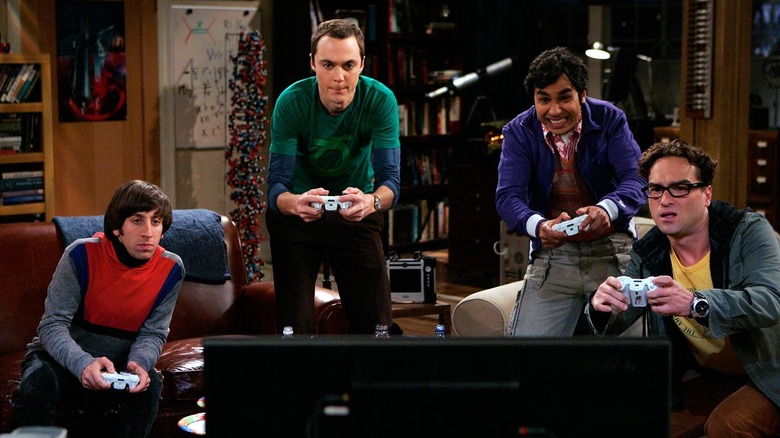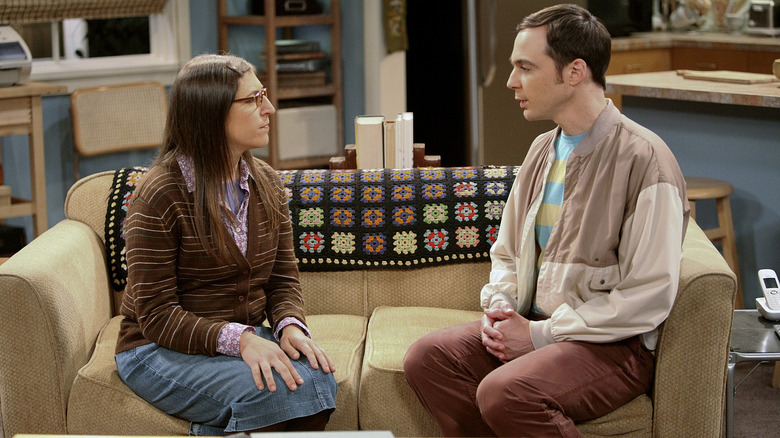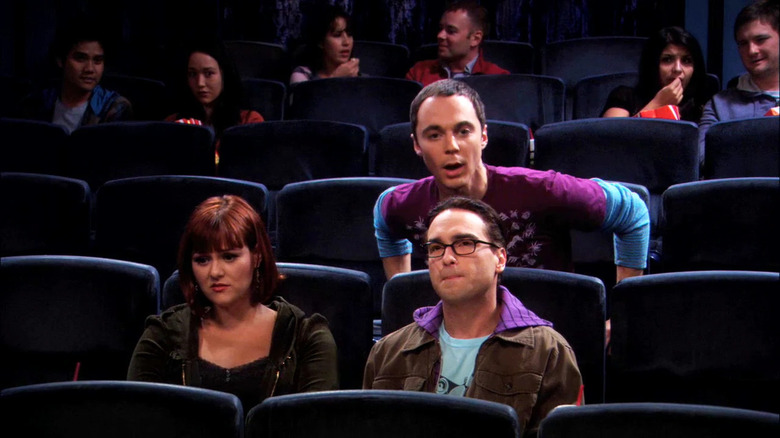Why The Big Bang Theory Was Temporarily Banned In China
If you live in America and want to watch "The Big Bang Theory" right now, there are a half-dozen different ways you can legally do so. The show is on Max, TBS, and Spectrum, and you can rent it or purchase it digitally on Amazon Prime Video, Apple TV, and elsewhere. It's also available via bundles and in reruns, and depending on how you feel about the nerd culture sitcom that ended in 2019, it might even be a bit too ubiquitous.
The show's geek appeal has spread all over the world, but around the time of its eighth season, it actually became unavailable in one major global market for reasons that were never fully explained. According to Time, "The Big Bang Theory" was banned in China in 2014 after being suddenly removed from the country's streaming services. It was one of numerous shows to find itself in this position at the time, along with the popular crime procedural "NCIS," political drama "The Good Wife," and even David E. Kelley's "The Practice" (which had ended years before it made headlines for its removal from Chinese streamers). "The Big Bang Theory" ultimately returned to Chinese streamers a year later (per Fortune), but its temporary removal kick-started a bigger conversation about censorship in the third-largest country in the world.
China claimed The Big Bang Theory violated a broadcast clause
According to Time, the show's removal coincided with a crackdown on the internet in the People's Republic, which has had a fraught relationship with Western media for a long time yet is also a major market for American films. According to an archived human rights report shared by the U.S. state department in 2015, China's State Administration of Press, Publication, Radio, Film, and Television said "The Big Bang Theory" and the other shows in question may have violated a clause in its online broadcasting rules — one that prohibits violence, porn, and "content that violates China's constitution, endangers the country's sovereignty and territorial integrity, provokes trouble in society, promotes illegal religion, and triggers ethnic hatred."
Though "The Big Bang Theory" is neither pornographic nor violent by most standards, its problematic attitudes towards Indian people, as embodied by Kunal Nayyar's Raj Koothrappali, could potentially be considered something close to ethnic hatred. However, the group SARFT never actually clarified which part of the clause the show might have broken, and also said series could be removed if they're "out of copyright." The ambiguity surrounding the show's sudden departure led outlets to report it may have been something of a power move, with China taking action after "The Big Bang Theory" became wildly popular. According to Fortune, the series garnered a whopping 1.3 billion views in the time before it was taken off the streamer Sohu, making it a cultural juggernaut with plenty of influence.
When The Big Bang Theory returned, it was met with new restrictions
At the time, critic Tan Fei wrote for the Chinese outlet Global Times (per Time) that the decision related both to younger viewers and the local film scene, explaining, "The machetes the monitoring departments waved to the U.S. dramas are not only aimed at protecting teenagers' physical and mental health but, on a deeper level, are aimed at protecting our weak domestic film industry." Time also pointed out that the move felt like a crackdown from the Chinese government aimed at regional streamers that, up to that point, had been able to make international content licensing deals without governmental approval. That freedom apparently vanished when "The Big Bang Theory" returned, as Fortune noted that SARFT began going over full seasons of shows with a fine-toothed comb, censoring them if applicable before they got added to streamers.
Given the Chinese government's considerable history of censorship, none of this is particularly surprising. Nevertheless, fans were surprised to see a show like "The Big Bang Theory" caught in the crosshairs when other shows weren't scrubbed. "Breaking Bad," for example, remained on legal streamers after "The Big Bang Theory" was removed, leading to plenty of confusion over what, exactly, made the Chuck Lorre sitcom worth censoring. Clear answers were never given, but the series' eighth season – which ends with Leonard (Johnny Galecki) and Penny (Kaley Cuoco) heading to Vegas to elope — finally arrived on Chinese streamers in the summer of 2015. It's unclear what, if anything, censors cut from the show before letting the Chinese public see it, much less if the country has been able to experience its prequel-spinoff "Young Sheldon" in all its glory.


